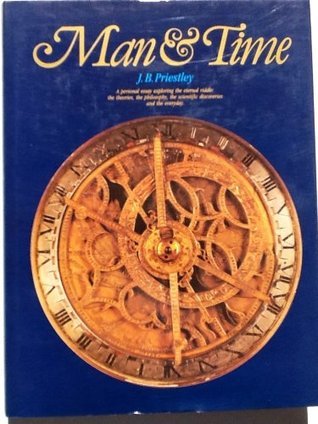In Man and Time, the erudite, entertaining, and occasionally ostentatious J. B. Priestley takes us on a grand tour through, you guessed it, Time—and it’s a fun adventure indeed. Priestley, a self-confessed “Time-haunted man”—you’ll have to figure out for yourself what that means, since he offers no explanation—was a writer of fiction and a dramatist by trade, so he takes a bit of an excursion here as he offers us his take on Time.
The book covers a broad range of time-related topics, including an interesting account of the development of clocks and calendars, man’s relation to time through history, and the fascinating subject of prevision and multiple time dimensions. Priestley concludes with an examination of the ideas of J.W. Dunne—a prominent time theorist in his day—as well as an account of his own personal theories of Time. While Priestley is no scientist and doesn’t pretend to be, he explores these topics in depth and is quite readable, lending a thoughtful and philosophical perspective as our guide.
One of the more enjoyable parts of the book is Priestley’s assessment of precognition and the FIP (future-influencing-present) effect. To explore these subjects he examines a dozen or so letters taken from a huge pile of mail he received while writing the book. Penned by ordinary people from all walks of life, the letters detail personal experiences with Time, placing a special emphasis on precognitive dreams. For those interested in precognition and FIP, this section is particularly noteworthy.
In spite of the book’s fascinating subject matter, Priestley does lose the thread occasionally, going off on one tangent or another and straying from our subject of Time. But even he seems to be aware of his digressions and soon gets things back on track. Another minor fault is that throughout the book Priestley is at pains to apologize for not having enough space to include more examples of this or that idea, more quotes from this or that book, etc. Ironically, if he had just cut out his many apologies he probably would have had room to include some of the very things he felt he was unable to squeeze in.
One place he could have done some pruning is in his lengthy discussion of J.W. Dunne whose theories Priestley pretty much dismantles anyway. Having read Dunne’s An Experiment with Time, I feel Priestley makes the same mistake as Dunne—namely, getting bogged down in the particulars of Serialism, which is a fairly complicated and as such not very engrossing theory of Time. The emphasis on Dunne is especially unfortunate when you consider that Priestley had to condense his letters/precognition section in the interest of brevity. Based on the massive volume of correspondence he received, who knows how many interesting letters about precognition and FIP were omitted to make room for Dunne?
Still, for the most part Man and Time is an enjoyable read and even quite fascinating in places—after all, what could be a more mesmerizing task than seeking to uncover the true nature of Time? If you are of a similar mind—and if you have the least suspicion that you might be Time-haunted, as was Mr. Priestley—then reading Man and Time will no doubt make for a worthwhile journey.

